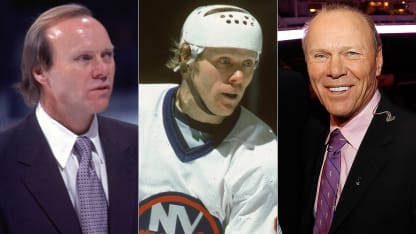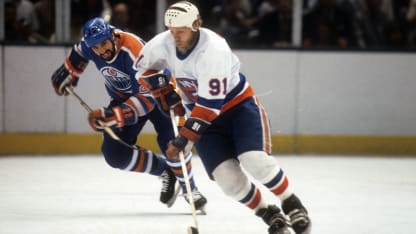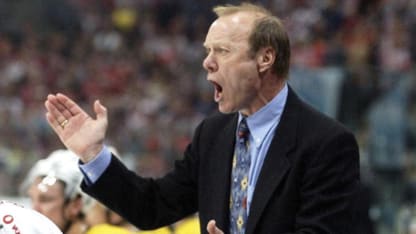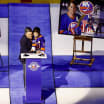On Saturday afternoon, Butch Goring will become the eighth player in team history to have his number retired, when 91 gets raised into the rafters at Nassau Coliseum.
It's a well-deserved honor, a formal acknowledgement of how crucial Butch was to the Islanders' Stanley Cup dynasty. Very few players can be referred to as the final piece of a team's puzzle, and there's no debate that his acquisition was a catalyst that got the Islanders over the hump and kickstarted their four-Cup run from 1980-1983.
An Isles Life: Butch Goring
Looking back at Butch Goring's life as a player, coach and broadcaster with the New York Islanders

By
Cory Wright
NewYorkIslanders.com
BUY TICKETS | CEREMONY DETAILS
Perhaps even fewer players have ever had their numbers retired playing as few games with a franchise as Goring, who clocks in at 332 regular-season contests and 99 playoff games from 1980-85. Goring's imprint on the Islanders doesn't run just five years, but rather parts of five decades. Since 1980 he's left his mark on the franchise in a multitude of ways, as a player, minor league coach, NHL coach, alumni ambassador and broadcaster.
"If you cut him open I'm sure you'll find an Islander crest somewhere around one of the ventricles of his heart," said Howie Rose, the team's play-by-play broadcaster from 1995 to 2016.
Before Butchie gets his number raised to the rafters NewYorkIslanders.com looks back at an Islander life well lived.
#
BUTCH THE PLAYER
On March 10, 1980 Islanders General Manager Bill Torrey made a move that changed the trajectory of the franchise.
After faltering in the playoffs in 1978 and 79, and a so-so (by Islanders' standards) regular season, Torrey wanted to shake things up. The general manager shipped out the team's first-ever draft pick, Billy Harris, and defenseman Dave Lewis at the trade deadline, bringing in a Los Angeles Kings center named Robert "Butch" Goring.
"Butch who?" Mike Bossy recalled asking when he first learned of the trade. After all, access to highlights and information was limited back in 1980 and the Isles and Kings didn't exactly play each other very often.
It didn't take long for Bossy and the Islanders to appreciate the talent they'd acquired. Butch filled a need for the Islanders, a veteran center who could back up Bryan Trottier, provide some offense, play power play and penalty kill and be defensively responsible. That's the thing about being the final puzzle piece - you've got to fit into your surroundings.
"He brought a little leadership and veteran presence to the team," Bossy said. "He got here and he understood the talent that we had on our team, but couldn't really understand why we hadn't won yet. He brought all of his experience and his exceptional hard work to the team that we had in place and just fit in perfectly right from the start."
The Islanders responded immediately, going 8-0-4 to close out the season. Butch recorded 11 points in his first 12 games.

© B Bennett/Getty Images
"They had a specific need and obviously they did their homework," Butch said. "I fit that bill. I wasn't nervous about it because I was 29 years old, I knew what my game was, I'd been doing it for 11 years, so I didn't feel any pressure to change my game in any way, shape or form. I knew why I was there and what they were looking for."
Butch's playoff numbers stand out, especially in the first two postseasons, as he recorded 39 points (17G, 22A) in 39 games. He won the 1981 Conn Smythe Trophy as playoff MVP, with 20 points (10G, 10A) in 18 games, including five goals in the Stanley Cup Final vs Minnesota. Beyond the numbers Butch played a two-way game and killed penalties, offering a well-rounded skillset to compliment the offensive talents of Bossy, Denis Potvin and Trottier.
"He was that factor in the locker room that our team needed at that time, keeping guys loose, but serious when needed," Ken Morrow said. "Speaking from my scouting lenses, he did everything really well. That's invaluable to a coach. He was probably the best penalty killer in the NHL at that time. Power play, face-offs, and the energy he brought to every shift as well."
When it was all said and done, Butch had 195 points (87G, 108A) in 332 games for the Islanders and another 68 points (28G, 40A) in 99 playoff games. The most important number though is four - the number of Cups he helped the Islanders win.
That helped Butch's reputation and credibility as he transitioned into coaching and it was clear the coaching bug was starting to take hold in his later years with the Isles. According to Rich Torrey (
via a tremendous ode to Butch by Stan Fischler
) Butch had the GM's son tape player sessions on a VCR, as he became a player-coach for the Islanders from the 1981-82 season onward.
He was eventually waived by the team in 1985 and claimed by Boston, but in a recurring theme, Butch would not be separated from the Islanders organization for long.
#
BUTCH THE COACH:
Butch was a player-coach with the Islanders from 1981-85. After 39 games with the Boston Bruins in 1985, he retired from playing and went right behind the bench with the B's taking over the head coaching duties in 1985-86.
He went 42-38-13 (W-L-T) in 93 games with the Bruins, but the fit wasn't right and he found himself out of a job in his second season. So he went west, landing as the bench boss with the WHL's Spokane Chiefs in 1987, but it was similar to his Boston experience, ending after a season and a quarter.
That's when Bill Torrey came calling, offering Butch a chance to mold future Islanders up in Capital District, the Isles AHL affiliate in upstate New York. In three years (1990-93) Butch started to hit his stride, helping guide young players like Travis Green, the current Vancouver Canucks coach, who he also had in Spokane.
"He was a big influence on my hockey career, I owe Butch a lot," said Green, who played 14 years in the NHL, including six with the Isles. "I was fortunate to have him in junior as well as the AHL and in both places he helped me in different ways. He really helped me understand the center position, the importance of playing two-way hockey, not just worrying about scoring goals."
Green had a couple of solid seasons in Capital District and was antsy to get up to Long Island, but credited Butch with waiting until Green was truly ready, setting him up for success rather than going up too soon.
"My first year in the AHL, I thought I was ready to play in the NHL and looking back now I wasn't even close to being ready," Green said. "He was being realistic with where I was at in my career. That was a huge part of how he helped me when I was in the American Hockey League, knowing when the time was right that a player was ready to go up and when he wasn't."

© Christof Koepsel/Getty Images
"If Butch wasn't that way with me, I quite easily might not have played in the NHL," Green added. "Not only is he a good friend of mine he's also a big part of why I played in the NHL."
Butch spent the next six years in the now defunct International Hockey League, first with Las Vegas, then with the Islanders affiliates in Denver and Utah, winning back-to-back titles in 1995 and 96 with Denver and Utah respectively. The championships were a type of validation, but Butch's main focus was developing players. He's always seen himself as a player's coach and a teacher.
"One thing I always wanted to do, it didn't matter what level I played at or coached at, particularly junior of the AHL, is I taught people how to play at the NHL level? (or should it just be "taught people how to play IN the NHL)," Butch said. "I didn't teach them just to win, I taught them - in my mind - how if you got the chance, what the expectations were going to be and how you'd be able to stay."
Eventually he got another crack at the NHL, coaching the Islanders in the 1999-2000 and 2000-01 seasons. It meant a lot for Butch to be behind the bench of his former club, even in the midst of a rebuild. They went 24-48-9 in his first season, but expectations were low and Butch felt his team competed hard and that he was laying a foundation.
"That team had a lot of fun. We knew what we were. We worked hard and we celebrated wins and I think guys would tell you they had a lot of fun that year," Butch said. "There was an expectation to play as a pro."
When the expectations changed and the record didn't, Butch was let go, kicking off another nomadic stretch that included four years in Germany (2001-05). He won a DEL title in 2003, but was ready to return to North America. Except when he came back, it wasn't as a coach, but rather it was the start of the third act of Butch's hockey life.
#
BUTCH THE BROADCASTER:
Butch Goring doesn't reflect on his career often, but he likes to think of himself as a player first, coach second and broadcaster third. It's understandable for someone who lives for competition, but it's a little ironic that Goring's longest stint with the Islanders has been in the broadcast booth.
Butch has been a part of Islanders broadcasts for over a decade starting as studio analyst during the 2007-08 season, before the team's move from FSN New York to MSG. He worked as the studio host from 2008-10 and moved up to the booth at the start of the 2010-11 season, joining Howie Rose as the team's color commentator. He's been in that role ever since, offering his take and guiding Islanders fans through the ins and outs of the game. It was never part of the grand plan though.
"I can BS with the best of them, but I never really thought about it as a career," Butch said. I was really interested at the time as a player, then coaching. I never really thought about being involved as an analyst, though my brother always said to me 'you should be an analyst, you understand the game and you can talk about it' I was sort of in between what I wanted to do with my world."
Butch remembers his first rehearsal during an Islanders-Sabres playoff game in 2007, and the producers being worried he was going to pass out. He's come a long way since then and has learned many lessons, including less is more, not trying to be too wordy with his analysis, especially as a color commentator.
"I got a lot of help," Butch said. "Howie Rose was amazing. He was such a professional and he could lead you anywhere you wanted to go and get you relaxed and he had great wisdom for me. And Jiggs McDonald] and now Brendan [Burke], it's been a lot of fun in that regard too. Brendan might have had a more difficult time with me when I was starting my career, I'm a little more polished now. I've got a lot of help along the way and I've been fortunate I'm working with three really talented people."
Rose said Butch was an incredibly valuable resource for him personally - and by extension for Islanders fans at large.
**BUTCH JERSEY RETIREMENT**
**WRITTEN COVERAGE**
[Fischler: The Butch Goring Trade
Goring and Tonelli "Humbled"
Tonelli Thankful for Jersey Retirement
Fischler: Tonelli Appreciation
MORE BUTCHIE
In honor of lifting #️⃣9️⃣1️⃣ to the rafters THIS Saturday, here are #Goring91 Wallpapers! 🤩🤩🤩
— New York Islanders (@NYIslanders) February 26, 2020
Tickets are still available: https://t.co/0Lp1nHIu8v pic.twitter.com/JHEdUZr8sB
Buy Tickets
Isles TV: Tonelli Jersey Retirement
CEREMONY DETAILS
Doors Open at 10:30 a.m.
Ceremony at 11:40 a.m.
"The number of different boxes that he checks," Rose said. "A guy who played in the league at a high level, was a championship player here, had four Stanley Cup rings to show for it. He was to the Islanders what Dave DeBusschere was to the championship Knicks. He'd been a minor league GM, a minor league coach, a coach in Europe. Not only did he win championships, but he'd won a Conn Smythe Trophy. He'd done everything in this game that you could. For me, that was an enormous resource."
Butch brings a well-rounded perspective to the game because of his experience. Even if he swaps Alex and Thomas Steen at times during a Blues game, he's always maintained a professional, objective take on the Islanders, not letting his personal ties to the team - he still gets irked when the Isles lose - get in the way of his analysis.
"I also think I bring a little sense of humor to the broadcast it's not just all straightforward," Butch said. "I think they like the fact that I'm knowledgeable and know what I'm talking about, but I think that personality of mine comes out and helps me be unique and different. I don't know if I'm better, but that's a part of me."
Over 10 years on TV has helped amplify Butch's popularity, as he gets exposed to a whole new generation of Islanders fans - the ones who have heard the stories of his skill and outlandish suits, but never got to see it for themselves.
Rose can attest to how popular Butch is among fans and NHL personnel. Traveling with Butch usually involves a stop to chat with a coach - Barry Trotz even went to the Butch Goring Hockey School as a kid - or take a picture with a fan. On flights, total strangers feel comfortable approaching him, which speaks to the intimate relationship fans have with their team's TV personalities. While movie stars may feel inaccessible and larger than life on a big screen, it's Butch - along with Brendan Burke and Shannon Hogan - who are in your living room 80 nights a year.
"Enormously popular," Rose said. "First of all, you have to be approachable. Not everyone in our business is that approachable or relishes the experiences of interacting with the fans the way Butchie does. He really enjoys it. The way Butchie played is the way he is as a person. He was somewhat blue collar as a player, which means the average fan relates to him that way. When they see a similar personality off the ice, they feel a kinship and a very strong bond."
He's generous with his time as well. Ahead of the Isles-Coyotes game on February 17, a fan presented Butch with a photo of himself as a Springfield King, LA's AHL team back in the late 60s and early 70s. Butch happily signed the old picture of him in purple and gold.
"I'm approachable. I'm not a pre-Madonna who runs away from people, I sign autographs, I take pictures," Butch said. "I'm often asked if I'm tired of signing [autographs] and I say no, why would I be tired? One day they aren't going to ask me."
#
BUTCH IN THE RAFTERS:
Butch was humbled when the Islanders told him they were going to retire his number. Whether or not he let it on it's something he'd always hoped for.
Of all the Islanders with their jerseys retired, Butch spends the most time at the rink and sees the banners nearly every day during the season, whether it's at practice at Northwell Health Ice Center or a game at the Coliseum. Everyone knows what it represents, the best of the best to wear the Islanders crest, some of the most important players in franchise history.
"I always say having your number retired is recognition of not only what you've accomplished as an individual player, but what you were able to accomplish as part of a team," Bossy said. "Butchie did a brilliant job, had a brilliant career personally, was a great fit and was an integral part of the four Stanley Cups."
"I only have congratulations for him," Bossy said. "It's an honor."
For Butch, it almost feels like it goes beyond just his playing days. His Islanders life spans five decades, regenerating itself in different capacities. It's a sign of an accomplished career and of the magnetic pull Long Island seems to have on its alumni.
"Wherever I was going, I always sort of returned flight back to the Islanders," Butch said. "I think it's appropriate. I'm comfortable on the Island, I'm comfortable with all the people on the Island and obviously very comfortable with the organization."
"I've been one of the rare guys able to stay in this business - which I love," he added. "I just feel really fortunate."
Butch said he knows that one day he'll be off camera and perhaps the autograph requests will stop coming as well. But once a number goes in the rafters, it's immortalized forever and that's what means the most to Butch, that it'll endure long after he's left the organization for good.
"You want people to know who you are and it's going to be great for me, my family and friends," Butch said. "When they go to the Coliseum or Belmont and every game, you'll be there and there will be times over the years where they won't even know who I am, but my name and number will still be there and that's a pretty incredible thing."


















